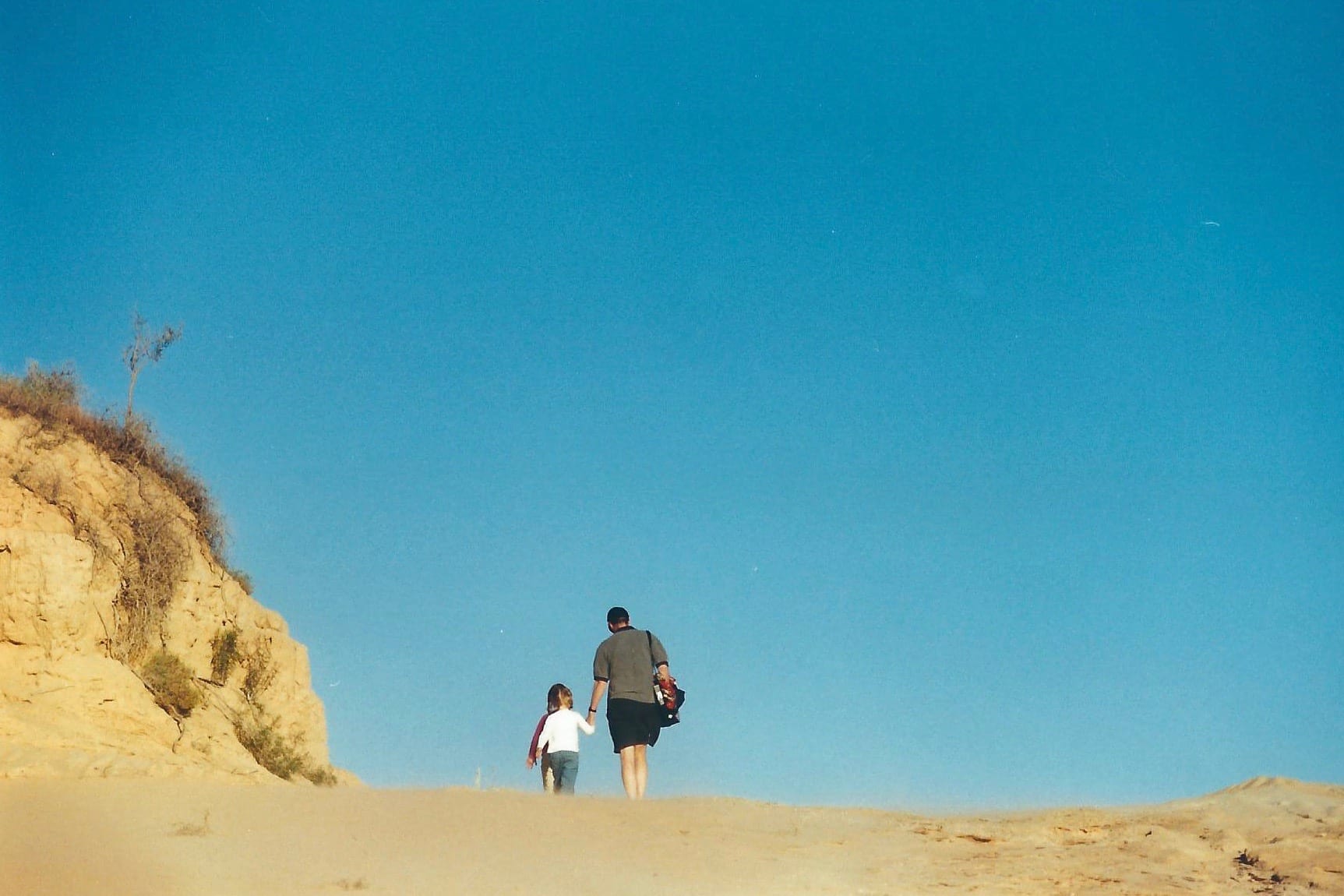Written by OTLR program facilitator, Jessina Oakes.
On this day 12 years ago – 10 June 2008 – just after 8 o’clock on an overcast winter’s morning; Mum emerged from our long, winding hallway, stepped into the kitchen, softly trembling with tears as she struggled to find the words to tell us that Dad had passed away…
In 2004, my dad was diagnosed with melanoma skin cancer. In the following years, the cancer advanced to other parts of Dad’s body, and eventually, his brain… As my mum, 12-year-old sister, aunty, and uncle began to console one another, I escaped to the backyard. I played around with our black Labrador, fought off every tear attempting to break through, and repeated under my breath, “I believe the impossible, is possible to overcome…” (the lyrics from a song I had been listening to on repeat, to help me believe Dad would be okay). After a few more moments to myself, I returned to the kitchen and asked my uncle to take me to school. I’m sure it was a request that made little sense to anyone at the time, perhaps not even myself. In fact, I remember Mum pleading with me to stay home; I think it was hard for her to fathom that I didn’t want to be at home with my family. But, I was a 15-year-old trying to grasp onto any form of normality I could, desperate to run away from the onslaught of despair and pain that had just filled the house and my heart; and so, my uncle drove me to school.
My response to the news that morning sums up how I dealt with Dad’s passing for many years to come. I was looking for distraction in any place I could find it, and for the first few years, that distraction was school. It wasn’t that I really loved school, it’s just that I really didn’t love life outside of school. Home felt sad and empty, and the social, adventurous lifestyle we lived as a family began to fade.
Mum and I were also grieving very differently. I was impatient with her emotions and she was impatient by the lack of mine; and so, we fought a lot, and my sister always got stuck in the middle. It’s not as though I didn’t ever feel sad, cry, or acknowledge that I missed Dad – I just placed a lot of judgment on what I was feeling and couldn’t stand how fragile I felt when experiencing those feelings.
School distracted me until the end of 2010 when I finished Year 12, but then, when I was faced with decisions about my future and struggled to picture what I wanted my future to look like (especially without guidance from Dad), I delved deeper into another form of distraction; a distraction that resulted in me being treated as an inpatient for Anorexia Nervosa. I really am one of the lucky ones, to come out the other side of an illness that can take away and damage so much. Coming out of it though, meant facing the emotions I’d been fighting for years and confronting the enormity of losing Dad, and the trauma of that experience. With time, I have come to terms with the fact that I am never going to see Dad again, and am adjusted to living without Dad’s physical presence. Yet, in my experience, the grief has, in other ways, become more trying with time; it is hard when so many of the people around you go on with their lives or assume you have “gotten over it” when in reality, you’re still hurting.
As I have gotten older and had more life experiences, I have noticed Dad-shaped holes in places I never expected to find them. I remember starting university and commuting to campus on the train, and thinking about how Dad used to travel on the same train line to get to work; I just wished that I could text him to see what time he would be leaving work so we could coordinate train times, and get the train home together. Early on, I liked being able to imagine what Dad would think about a situation, or what he liked: “Dad would like this song”. As time has gone on though, that instinctual confidence in knowing, for example, Dad’s taste in music, has been followed by a moment of doubt: “Would Dad have liked this song?” It has also been tricky when new people have entered my life. There is always a time when they ask about your parents, and you have to decide whether you’re going to correct them and have an awkward conversation that often leaves that person feeling uncomfortable, or whether you just go along with it. Sometimes it’s nice to pretend and speak about Dad in the present tense, other times it just leaves you feeling uneasy because you know that what you’re saying isn’t real.
I imagine that the emotions I feel and thoughts I have about losing Dad will continue to shift as time goes on and as I enter new stages of my life. Over the years, I have gained comfort from sharing memories, listening to stories and learning more about him from my family and his friends; and honouring Dad’s memory, especially on days like his birthday, and today, the anniversary of his passing. I have come to learn that grief isn’t linear, nor does it have a set expiry date, if one at all. Losing Dad was an extremely painful experience that has had an enormous, lasting impact, especially during such formative years of my life. Although, I still continue on, and strive to live my life to the fullest, just like Dad did.
I completely respect that every person has a different relationship with their dad, but for me, Dad was this larger than life, a lover of life larrikin who injected so much laughter and passion into my childhood. So, even though I haven’t been able to get to know Dad as an adult, my childhood was so rich, and I now find a lot of catharsis and contentment in enjoying the things that Dad taught me to love in life: to go on adventures and explore the world; to get up early; to get outdoors amongst the elements; to ski; to surf; to look up at the sky with wonder; to listen to music loudly and feel the beat; to be imaginative, inventive, ambitious, and spontaneous; to take risks and get out of my comfort zone; to laugh and laugh at myself; and, to have fun and not take life too seriously. Admittedly, it isn’t always easy for me to live in line with those principles, but when I have moments where I feel lost and unsure about where I am at or where I am going in life, turning to those values and seeking out those kind of experiences helps propel me onwards, and upwards.
Please reach out if you need support:
The Butterfly Foundation
https://butterfly.org.au/
1800 334 673

